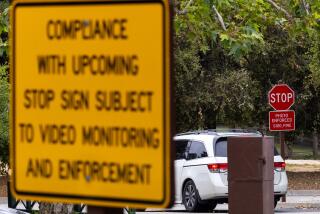How to Avoid a Traffic Ticket: Be Courteous, Respectful, Honest
Look--there in the rear-view mirror. It’s a patrol car, lights flashing, and before you have a chance to mutter, “Not me!” the officer flicks the siren on for a brief wail and nods somberly in your direction. Yes, you.
We asked readers who have escaped traffic tickets to share their secrets. (Next week, we’ll hear from law enforcement officers about what works and what won’t from their point of view.)
Unless you’ve done something really out of line, the officer isn’t going to begin with, “You have the right to remain silent. . . .” But you should keep those words in mind. Lesson No. 1 from those who have been through it is: Keep your mouth shut as much as possible.
Also, readers advise, try to understand the officer’s point of view. Be courteous and respectful, but don’t patronize him or her. And although you should appear genuinely concerned that you may have violated the law, don’t admit any transgression unless cornered. Lastly, tell the truth, no matter how damning it may seem.
Harlie C. of Huntington Beach became acquainted with those lessons--especially that last one--inadvertently on a highway outside Palm Springs in 1980. Although no officer is likely to be as lenient with an intoxicated driver today, Harlie believes the principles involved would work for any other less serious violation.
“As soon as the alternating blue and amber lights . . . pulled behind me as I eased off the highway, I knew I was in trouble--real trouble,” he writes. “I’d had one 502 (drunk driving violation) just months before, and another one would mean jail at the very least.”
It was 2:30 a.m. Harlie, now an 8-year member of Alcoholics Anonymous, had been drinking all evening. His wife was in the car with him.
“ ‘Have you been drinking?’ The question I dreaded--now out in the open, no hope now.
“ ‘Yessir,’ my voice croaked.
Harlie followed the officers’ instructions. “Walk the line, touch your nose, hop on one leg, say the ABCs, fast, all of it with a feeling of deja vu. I thought I was doing pretty well, but the two patrolmen weren’t applauding.
“ ‘How much have you had to drink, Mr. C-----?’ Again the same polite tones.
“Like any red-blooded driver in the same situation, my first thought was, ‘a couple.’ ” But then Harlie remembered the words of his drivering school instructor: “ ‘It’s never one; it’s never three; it’s always two.’
“Then, as if the words were coming from someone else, I heard my own voice say, ‘I don’t know.’ And I waited for the cuffs, silently cursing my own stupidity.
“The patrolmen exchanged glances. ‘What do you mean you don’t know?’ ”
Harlie insisted to them that he didn’t, he says. After what seemed like an eternity, the officers asked Harlie’s wife to drive and left it at that.
“It wasn’t until the next morning, reliving the event, that it registered with me why this time was so different from the first. The (first) officer . . . was just as polite, just as solicitous, and said ‘please’ just as many times . . . And I’d been in just about the same shape.
“What was different? The first time I’d lied. I’d said ‘a couple’ when any sixth-grader could have told it was more, much more,” Harlie says. He had also tried to cheat, opening his eyes just a crack during the nose-touching test. “And I had been a little indignant. That’s the only difference.
“It finally sank in,” Harlie writes. “Officers are people, just like we are. . . . They don’t like to be lied to, just like us. They don’t like smart talk, indignant righteousness, nor cheaters. I wouldn’t want to predict that honesty will always keep you out of jail--it won’t. But it damn sure won’t hurt.”
Days before Linda Schatzman of Anaheim saw the flashing lights behind her, a friend had given her some advice about how to avoid a ticket. “What a coincidence,” she thought as she pulled over for the only time she has been stopped.
License and registration in hand, “I smiled and said, ‘Good morning, officer. What seems to be the problem?’ After he said that he believed I had not made a full and complete stop, I expressed some mild surprise and then engaged him in conversation regarding the law and its importance, admitting concern that I had been so irresponsible. Within five minutes, he waved me on my way, clean record intact.”
“When I was younger,” writes John Russell, 59, of Santa Ana, “I would say as few words as possible and act as if I had never been stopped before or even ever done anything wrong. I looked worried and frightened. This worked until I was about 26 years old.”
Russell says a friend’s experience provides a good illustration of how not to do it: “He told me he’d gotten a ticket every time he’d been stopped since he was a kid. But one officer said, ‘I really shouldn’t give you a ticket.’
“ ‘Then why the hell are you going to do it?’ ” the friend blurted out. “He got the ticket,” Russell says.


